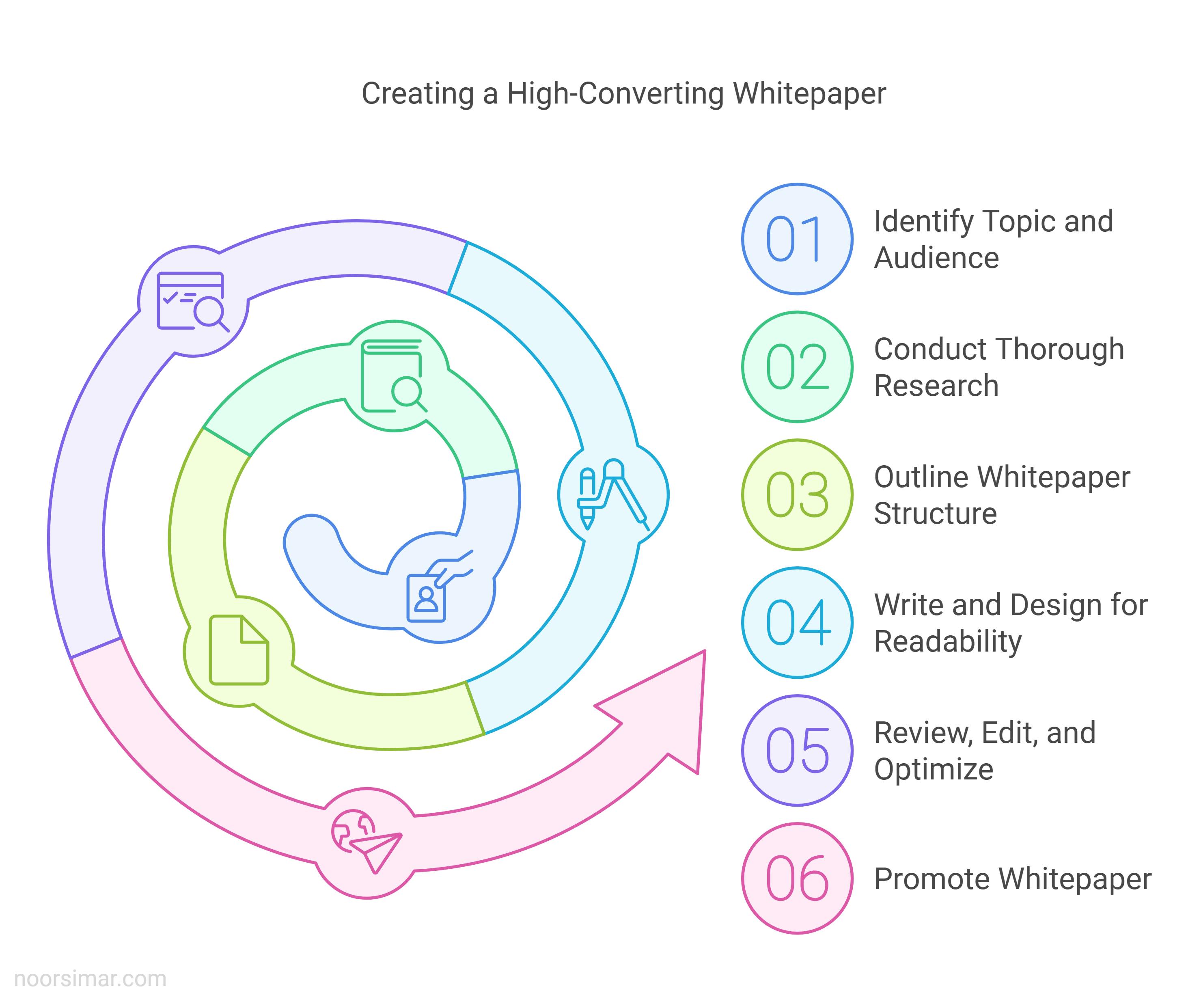Whitepapers are an underutilized but highly effective tool for small cybersecurity businesses to establish authority, boost SEO, and generate leads. With 91% of IT buyers ranking whitepapers as critical in their decision-making process, they offer unmatched value in a competitive market. This guide takes a look at how whitepapers build trust, improve visibility, and drive conversions; and why they should be a key part of your content marketing strategy.
In a World of Noise, How Do Cybersecurity Underdogs Compete?
Let’s face it: cybersecurity marketing is crowded. Whether it’s blog posts, webinars, or product updates, the digital landscape is noisy. Smaller players often feel drowned out by the larger competitors with sky-high marketing budgets.
But what if there was a marketing tool that leveled the playing field?
→ whitepaper marketing – a level playing field where small cybersecurity firms can rise above the noise and establish themselves in the industry.
Why Whitepapers? The Data Speaks for Itself
Whitepapers are more than long PDFs sitting idly on a website. They’re data-heavy, research-backed assets that 91% of IT buyers consider essential during the purchasing process.
Key Stats Highlighting the Effectiveness of Whitepapers
- Acording to DemandGen 71% of B2B buyers admit whitepapers influence their purchasing decisions.
- Cybersecurity decision-makers actively look for thoroughly cited, authoritative content to guide their decisions; whitepapers check all these boxes.
- Whitepapers drive SEO gains, with a single document capable of generating 25+ backlinks on average when promoted effectively.
What Makes Whitepapers Stand Out in Cybersecurity?
1. Trust Is Currency & Whitepapers Build It
Cybersecurity isn’t just about selling a product. It’s about selling peace of mind. When your whitepaper unpacks complex problems with actionable, research-backed solutions, you position your brand as a trusted authority.
Take this real-world example:
Case Study: A mid-sized cybersecurity firm published a whitepaper analyzing ransomware trends. The result? A 200% increase in qualified leads and a reputation boost that landed them partnership opportunities with larger firms.
2. SEO: A Goldmine for Niche Keywords
Whitepapers aren’t just static documents; they’re magnets for high-intent traffic.
- Targeting long-tail keywords like “cybersecurity for small businesses” or “compliance best practices” positions your brand where buyers are searching.
- Optimized whitepaper landing pages deliver low competition, high conversion SEO advantages.
Pro Tip: Create content clusters around your whitepaper topic. For example, if your whitepaper focuses on “Cloud Security Compliance,” write related blog posts on GDPR, SOC 2, and ISO 27001 to interlink and drive traffic.
3. Lead Generation on Steroids
Every download of a gated whitepaper represents a potential client interested in your services. A well-optimized whitepaper landing page with a clear call-to-action can turn casual visitors into warm leads.
Did you know? Companies that use PDF for lead generation report a 30% higher conversion rate compared to other content formats.
How to Create a High-Converting Whitepaper
The beauty of a whitepaper lies in its structure.
Here’s a proven formula to ensure your cybersecurity marketing hits the mark:
Step 1: Nail Your Topic
Focus on cybersecurity challenges that your audience is actively trying to solve. Think ransomware mitigation, cloud vulnerabilities, or compliance frameworks.
Tip: Monitor forums like Reddit’s r/cybersecurity or LinkedIn groups to identify trending pain points.
Step 2: Dive Into Research
The cybersecurity audience thrives on data. Back every claim with reputable sources like NIST, FBI, Forrester, HackerNoon or Gartner reports. Include case studies, charts, and actionable checklists to enhance credibility.
Example: “According to the FBI’s Internet Crime Complaint Center (IC3) ransomware complaint data, the median loss associated with the combination of Ransomware and other Extortion breaches has been $46,000, ranging between $3 (three dollars) and $1,141,467 for 95% of cases.”
Step 3: Optimize for Readability and ICP
- Structured Content with Clear Headings
- Hierarchical Organization: Utilize a clear heading structure (H2s, H3s) to segment content, making it easier for readers to navigate and locate information.
- Descriptive Titles: Craft headings that accurately reflect the content of each section, guiding readers through the document.
- Visual Enhancements
- Data Visualization: Incorporate graphs, infographics, and flowcharts to present complex information succinctly, catering to visual learners and enhancing comprehension.
- Consistent Branding: Ensure visuals align with your brand’s color scheme and style, reinforcing brand identity.
- Summarized Key Takeaways
- Section Summaries: Conclude each section with bullet points summarizing the main ideas, reinforcing understanding and retention.
- Actionable Insights: Provide clear recommendations or next steps, offering practical value to the reader.
- Tailoring Content to Your ICP
- Audience-Centric Language: Build your persona and use terminology and examples that resonate with them, demonstrating an understanding of their specific needs and challenges.
- Relevant Case Studies: Include examples that mirror the experiences and industries of your ideal customers, making the content more relatable and impactful.
- Addressing Pain Points: Directly tackle the common issues faced by your ICP, positioning your solutions as tailored remedies.
- Readability Best Practices
- Concise Sentences: Employ short, clear sentences to enhance readability and maintain reader engagement.
- Active Voice: Write in the active voice to create dynamic and compelling content.
- Accessible Language: Avoid jargon unless it’s commonly understood by your ICP; when necessary, provide clear definitions.
Whitepapers must balance depth with clarity.
Creating a stellar whitepaper is only half the battle. Here’s how to ensure it gets noticed:
1. Landing Pages That Convert
- Use persuasive headlines and emphasize the value (e.g., “Discover the Future of Threat Intelligence”).
- Include trust signals like testimonials or certifications.
- Make the form simple – ask for just a name and email.
2. Leverage Social Media
Tailor your approach to each platform:
- LinkedIn: Share data-heavy excerpts targeting decision-makers.
- Twitter: Use short, stat-driven updates with hashtags like #CybersecurityTrends.
- Reddit: Engage in r/cybersecurity discussions, linking your whitepaper when relevant.
3. Syndication
Distribute your whitepaper on HackerNoon, Medium, SlideShare, and Quora to reach a broader audience.
The Hacker’s Checklist for Whitepaper Success
- Focus on Pain Points: Make sure your topic directly addresses your target audience’s concerns.
- Cite Authoritative Sources: Back up claims with data to build credibility.
- Optimize for SEO: Use long-tail keywords and promote interlinking.
- Repurpose Content: Break down your whitepaper into blogs, infographics, and podcasts.
- Measure Impact: Use analytics to track downloads, backlinks, and lead conversions.
Conclusion: A Low-Cost, High-Impact Strategy for Cybersecurity Brands
Whitepapers aren’t just “nice-to-have” content; they’re your ticket to authority, visibility, and leads in a fiercely competitive industry. By crafting and promoting whitepapers strategically, even the smallest cybersecurity firm can punch above its weight.
Want to dive deeper into the “how”?













